2020 Surprise
First Appearances
The first time we can recall seeing Mallard ducks in our garden was back in a dull morning in 2016.
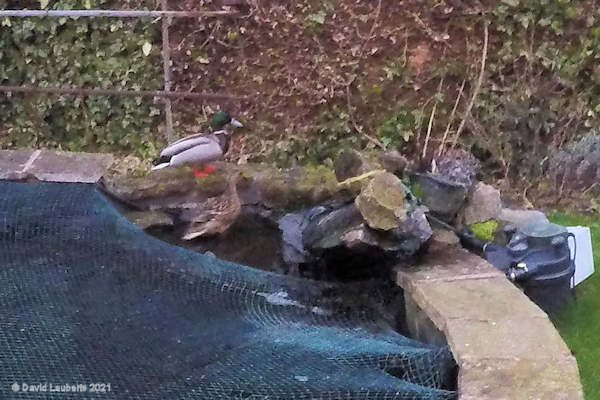
Mallard Ducks 8th March 2016
We had a heron visiting the garden on a regular basis and had covered our main pond with a net to try and preserve our fish. While going out early in the morning in early March that year to feed the birds I noticed that a pair of Mallards were actually under the net, swimming about on the pond. At first, I thought they were trapped, but when they saw me they soon swam for the open end of the pond, got out and flew away.
Little did we know they were scoping the garden out as a nesting site!
Whether this was Jemima or not we will never know.
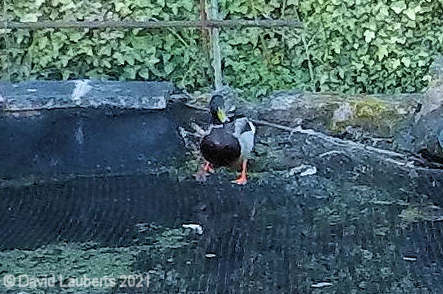
Mallard Ducks visiting April 7th, 2020
Fast forward to 7th April 2020. The Coronavirus had hit the world and the UK had gone into its first national lockdown a couple of weeks before. Whether it was because we were spending more time in the garden, and the ducks had been visiting each year and we had not seem them, but we again noticed them around the garden, on and under the pond net.
In reality we had probably missed Jemima visiting the garden over the previous month or so to make her nest in our garden and lay her eggs in the early mornings before flying back to her waterside home for the rest of the day.
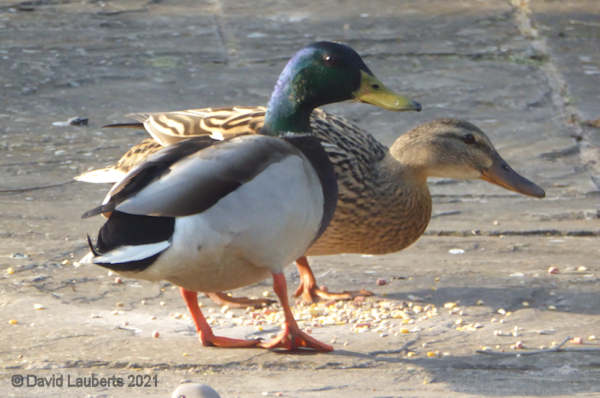
Mallard Ducks 12th April 2020
Jemima was probably now starting to incubate her eggs and was returning to her nest after going to feed and wet her feathers at her normal 'home' by the river or a local pond. She would meet her mate and return to the nest together. Once she went to the nest the drake would fly away 'home'. At the time we did not notice this :).
Over the next few weeks, we continued to see the ducks, particularly Jemima.
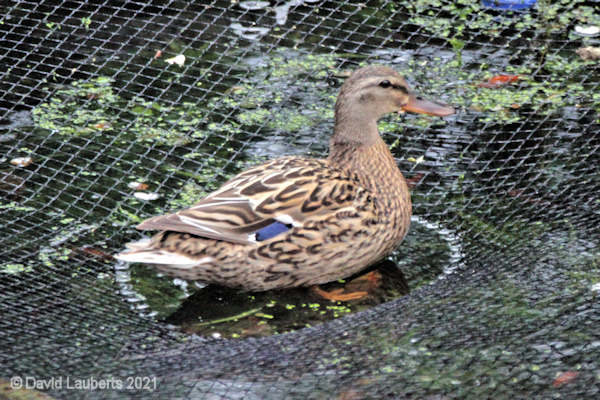
Jemima net sitting April 12th 2020
We were sadly personally distracted in this period, my mother, aged 92, was taken into hospital. Just as she was entering rehabilitation to leave, she caught COVID and died in hospital on the 24th April 2020. We visited her just before she died and caught COVID ourselves during the visit. It expressed itself in us a couple of days after she died. We had a scary week and quite a few months recovering.
Jemima happily went her own way in this period. We would see this apparently mad duck occasionally wandering round the garden, swimming on or under the pond, net. Though we did she her fly onto the ivy hedge/wall at the bottom of our garden we just thought she was flying off elsewhere. She was actually returning to her nest, hidden in the ivy on the wall.
We managed to catch her on camera, wandering on the pond net, while taking some timelapse pictures of other birds drinking and bathing in the pond. We thought she was just a lost duck and a bit deranged. She was probably just taking a rest from incubating her eggs or returning from a feed elsewhere and wetting her feathers before returning to the nest. Apparently wetting the feathers is important as it moistens the eggs when she returns to keep the shells soft and membranes from functioning properly and not shrinking round the chicks inside.
Surprise Guests
Sometimes you wake up to a nice surprise. On the morning of 17th May 2020, we opened the curtains and looked out into the garden, and there, nestling together under the apple tree near one of the ponds, was Jemima and 10 ducklings!
She eventually got up and lead her little flock to our main pond, and round to its shallow un netted end. She jumped up onto the rocks by the water ( some 9 inches) and expectantly waited for her brood to join her, as we watched- thinking they can’t possibly jump up there- one by one they appeared on top of the rocks and jumped down to join her swimming around the pond under the ‘heron protection net’ We thought it was amazing that they could do this with such ease and apparent grace so soon after being born (probably less than 12 hours).
The eggs must have hatched early in the morning and the mother had let them dry off and led them out the nest (at the time we did not know where the nest was, and it was only the following year we really found out). They were possibly resting before life’s adventures were to begin.
Meanwhile as they were happily swimming away, we were scratching our heads and discussing what to do with them. Out came the phones and good old Google.
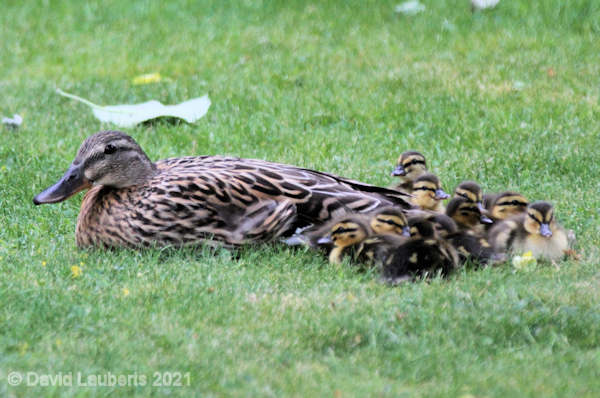
Jemima resting with her family May 17th 2020
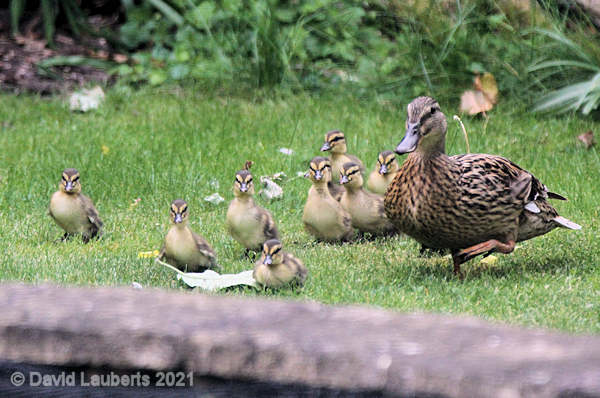
Jemima on the move 17th May 2020
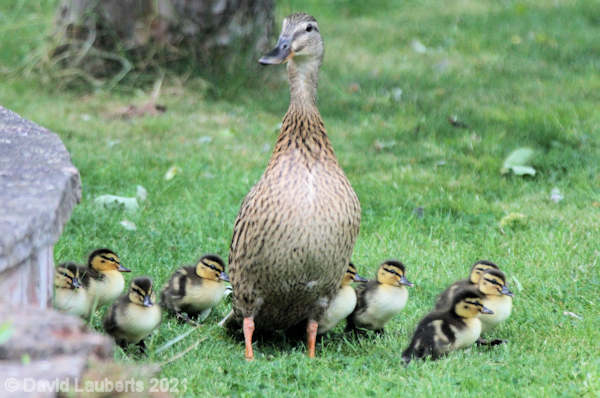
Jemima finding a way in 17th May 2020
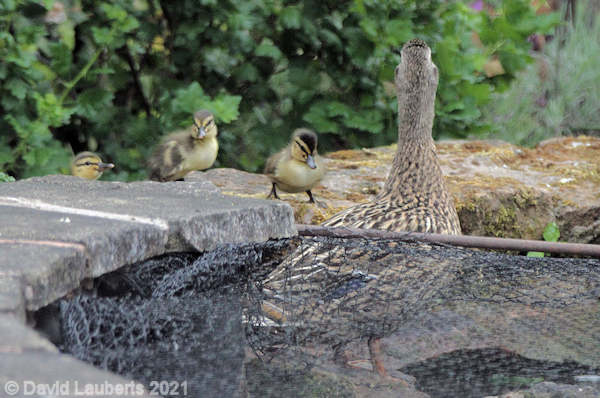
More ducklings scale the cliff May 17th 2020
The mother duck, having explored one pond, then came out , quickly followed by her happy band, and started to lead them round the garden with the obvious intention of leading them down to the nearby River Trent, just about ½ mile away, as the ‘duck’ flies. In reality it’s a bit longer and also part along a major busy ‘B’ road.
We are lucky enough to have quite a large garden with 3 ponds of various sizes. The mother duck continued all morning to lead her brood from pond to pond to swim, play, feed and also occasionally wandering round trying to find a way out of the garden.
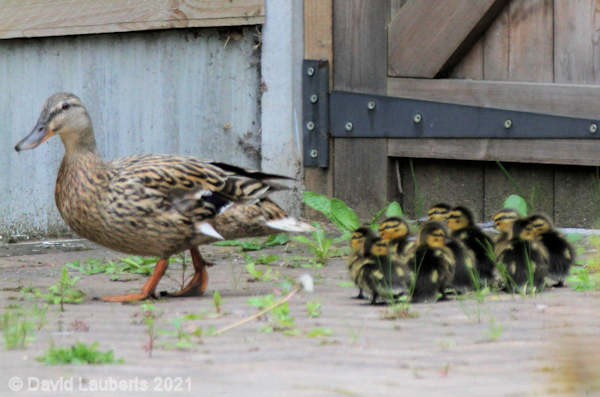
No way through for waddlers 17th May 2020
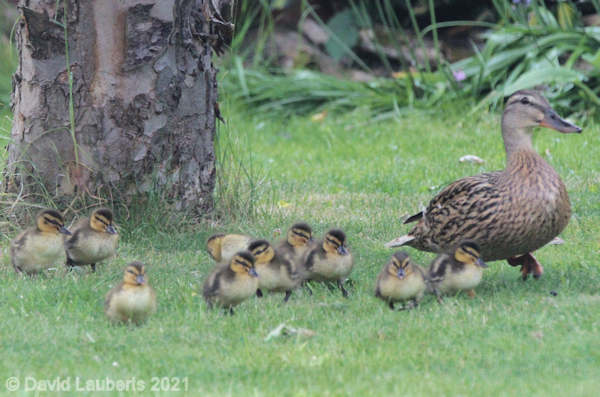
Exploring the garden 17th May 2020
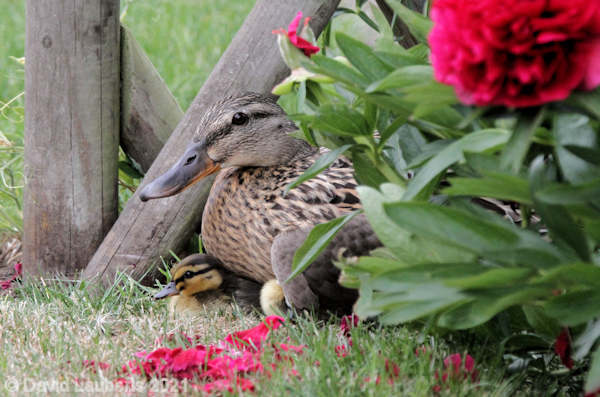
Resting in the shade 17th May 2020
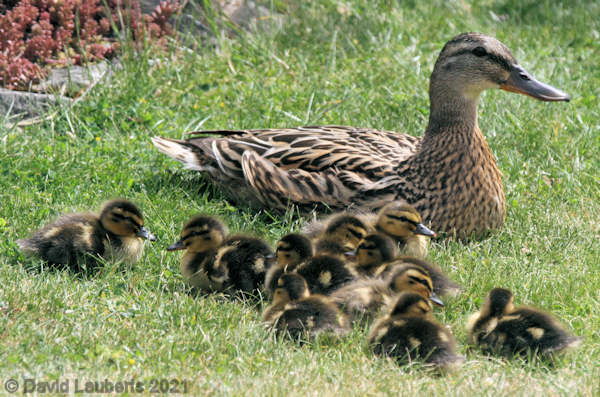
Taking in the sun 17th May 2020
We tried contacting the RSPB, but lockdown was still in its infancy and we got no response. From the material we found on the internet it seemed we had 3 choices, the
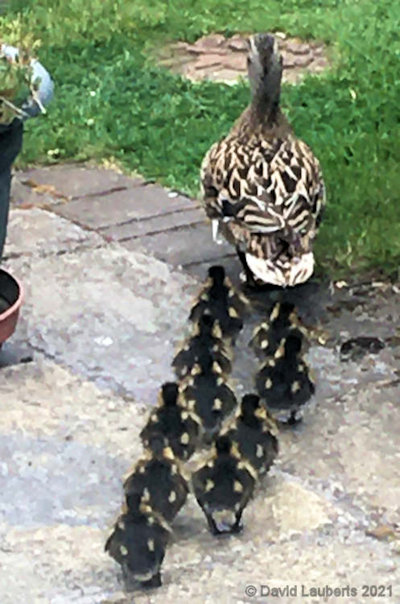
'As I go a wandering...' 17th May 2020
- Leave them in the garden and let the mother raise the ducklings in the garden
- Open the gates and let her find her way to the river by herself or shepherd them there.
- Catch them and take them somewhere to release.
The first was not really an option, she obviously wanted to get out, and even though they seemed quite happy swimming in one pond or another and meandering round the garden, resting under shrubs or on the grass she did keep periodically trying to lead them out. We also thought it was a bit selfish to try and keep them there.
The second option, opening the gates, seemed a bit irresponsible and just passing the issue onto someone else. Even shepherding them, though an option was not easy because of the path they could take and the main roads , even more difficult and stressful for all if we had to lead them where she did not want to go.
We decided on the third option, capturing them and releasing them at a local nature reserve.
Nervously reading the guidance we could find on capturing ducks with ducklings
Capturing the ducks
The essential thing was to safely catch the mother and have separate carry boxes for her and the ducklings.
We read that it was a good idea to have a blanket to throw round the mother and after finding an old camping blanket we got two cat/rabbit carrying cases from friends and relatives. (Because of COVID they had to leave them outside their houses so we could pick them up).
Jemima and her gang carried on happily in the garden flitting from pond to pond. Below are some clips we took with her ducklings on the pond. We didn't realise till the following year that the little 'chirps' we could her on the videos were the little ducklings calling to themselves. A very peaceful and restful noise.
At the time I also thought the first step would be to wait for her to take her party swimming in the pond under the heron net. We could then collapse the net on top of them and quickly gather them in. My wife was not really convinced by the idea, but we persisted with it. Please note COUNT THE DUCKLINGS before you start to capture them!
It was not really the bright idea I expected, though they grouped together as we approached the pond and were together under the net when I collapsed it, it was not so easy to actually get them out of the pond from underneath it.
A bit of panic ensued, we learnt then, that if a duckling can get its bill through something they will try to follow with their bodies. One poor duckling got his head through the net, fatally I am sorry to say. The others, and Jemima leaked out from under the net and out of the pond. I think we only captured a couple of them successfully in this way.
Luckily, I was able to throw the blanket easily around Jemima just after she got out of the pond and placed her safely in her own basket with a blanket to give her something firmer to stand on and act as a bit of padding.
I should say that you must be very careful picking up and handling ducks because of their wings, legs and the fact they have a complex respiratory system, with air sacs all around their body. Holding them too tight can cause breathing difficulties and even suffocation. Try to hold your hand gently around them, making sure there is always room for them to move around a little bit inside your hands. Hold them around the wings. DON'T try to catch them by their legs, you will only injure them. If you can, cover their heads/ eyes with a cloth or towel.
Frantically, we tried to try to locate the remaining missing ducklings which had fled to all corners of the garden and undergrowth. Most we located in the ivy at the bottom of the wall near the pond. I have to say they have evolved very good camouflage and an inbuilt expertise in trying to hid! A few more were located hiding around the tiny pond we have and around the back of a compost bin near there. We even found one still in the pond, head pushed into a rockery we have there. As we found them, we put them in their own pet basket, with a towel inside to give them something to stand on, act as padding, and more importantly help keep them in as we added more.
We (or I was) were really panicking now, we were one missing and Jemima and her ducklings in separate pet baskets were starting to make some noise and we knew we should move them as quickly as possible to their release point. We were searching high and low for the last duckling, re-counting those in the basket to make sure we had not miss-counted.
After several minutes we had almost given up on finding it and started to search the entire garden again for a final time. As I walked across the lawn towards some sheds I heard some squeaking behind me, and there the last one appeared from where it had hidden somewhere round the pond (it had obviously bested us with its expert camouflage and enemy avoidance skills) running across the lawn, flapping its little wings, and buried its self in amongst some comfrey shrubs in a flower bed. We extracted it from there carefully and put him with its brothers and sisters in the basket and transferred both carriers to the boot of our car.
We made a careful drive (to try and make their journey as comfortable as possible and not rock them in their baskets too much) to a local nature reserve.
The fun had not finished. As we opened the boot so we could carry them to the water's edge we found that two of the ducklings were running around the boot having escaped through the small wire mesh across the door of their basket (or the small diagonal air vents on the sides). If they can get their bill through it, they will try to get their bodies through!
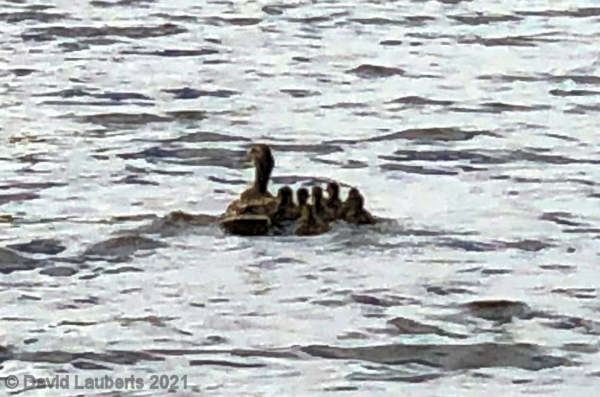
Paddling into the sunset 17th May 2020
Two further captures later, and we made it to a quiet spot by the water's edge. If you do take ducks and ducklings for release, please read up on the latest advice on how to release them. You don't want to get to this stage only for the mother to fly off into the distance leaving the duckling's still in their basket or on the bank.
We placed both baskets, so they were angled towards each other, and opened the ducklings basket first, out they fled and hid under the nearest bush, squeaking noisily. We opened Jemima's basket and she jumped/ flew a couple of feet into the water, quacking away. At first, we though she was going to fly off, but she turned towards the bank and the ducklings popped out one by one and jumped into the water and swam towards her.
Once in a little group, she turned towards the middle of the pond and paddled away with her brood around her. We watched her go, sending our love and best wishes after them.
We did return a couple of times to see if we could see her and her family, but though we did see a group of ducklings in the distance once, we really could not be sure if they were Jemima and her ducklings and trusted they would all be safe.
If was only the following year when we read that most ducklings do not even survive the first week (and maybe even the first day!), and this high lose ratio is why they have so many ducklings in the first place.
My sister in law, who is a teacher, used this as a COVID lockdown 'good news story' in her school newsletter. For the rest of the summer in our 'zoom' meetings, and get togethers, under the 'rule of 6', with family and friends it was a popular subject for discussion and laughter.